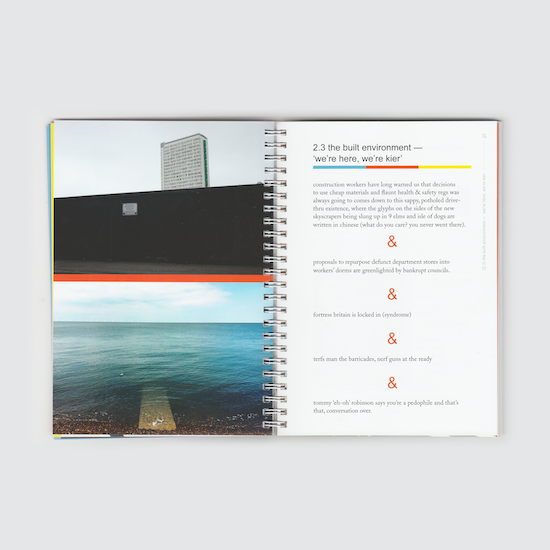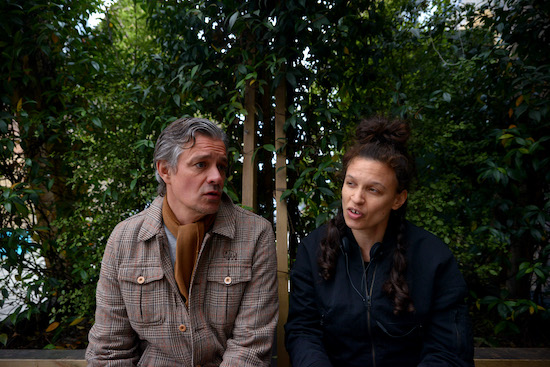life was like that already… now it’s the same only worse
That is the proclamation of London novelist Iphgenia Baal at the start of her latest book Compliances: A New Fear. Part faux-psychology textbook, part fictionalised journal (much like 2017’s Merced Es Benz, a novel told through text messages and emails, some Baal’s own, some fictional), it’s a collaboration between Baal and photographer Ben Graville for experimental publishing house Toothgrinder Press.
A caustic analysis of a normal island and all of its post-Covid hysteria, Baal here plays the prankster role of an acerbic analyst, picking up the pieces of a decadent society. Delivered in lowercase and spiral bound, Compliances lands somewhere between Capitalist Realism and a giant shitpost, by way of a GCSE school planner. Scattered amongst Baal’s unfiltered lambast are pictures taken by photographer Ben Graville, tilted scenes of lockdown London that bring its true apocalyptic colours to the fore.
I’m at Aaja, a social radio space by Deptford Bridge. Someone has just put a Beach Boys donk remix on a nearby boombox, and Baal and Graville sit supping lime and sodas. An affable pair, Baal speaks in wild soliloquies, preposterous anecdotes as enthralling as her prose, whilst Graville is a measured observer – together they’re the very definition of a writer-photographer duo. The book is the first published collaboration between the pair, who have been close friends for well over a decade.
The seeds were sown for the project in March 2020, when Graville would walk the streets of his native Deptford to take photos, snapping for signs of life. “I do a diary once a year, on YouTube,” Graville says. “I showed that to Ned (Green, of Toothgrinder Press) and he got back to me with the idea that we should publish a story alongside the photos. I automatically thought of Iphgenia… I’ve read all her books, and I thought her writing would go really well with the photos.”
“Ben sent me well over 100 photographs,” Baal cackles. “First I looked at them, and I ignored them. Then, after meeting with Ned and Ben, I sent them a word document full of weird sentences and half written things – I have a computer full of them – and there was one they really liked. ‘A purp’n’lean bugs bunny… compost bin’, so we went with that.”

With Baal continuing to write in response to Graville’s end times imagery, Compliances came together quickly. Whilst occasionally Baal’s writing matches up exactly to the photography, it’s probably more accurate to say that her words simply share a mood and feeling with the images; claustrophobic social commentary; gallows humour. “Two individuals,” Baal says of their collaboration, “intertwined but separate.”
“Sometimes the words and photos go completely together,” she elaborates. “Sometimes they’re in their own worlds. Like you’re having a conversation, half listening, and then you suddenly interrupt with something about yourself. I like that.”
This works so well throughout Compliances, because although Graville and Baal worked separately, they are of course responding to the same thing. In spite of this, Baal never explicitly references Covid – “it’s actually quite rare that there’s something so universal that you don’t have to say it” – simply alluding to it with a string of hallucinatory references to the past two years’ cultural malaise…
“— new world order! they said.
— necropolitix, they said.
— 5g and microchip injections, they said.
— biofascist police state, they said.”
“You don’t need to say it, because everyone’s lived it for the last two years,” Baal says. The lack of obvious Covid signifiers gives the book a certain timelessness. Essentially, society was fucked long before Covid, and will be fucked long after Covid. “We were already on that tip, it’s just expanded out to wider society…” Baal continues. “The block I lived in at the time was full of Irish alcoholics and Jamaican lunatics. For them, it was exactly the same. The Irish wanted to buy more booze, and the Jamaicans all wanted to buy more weapons… ready for this to be it, stashing.”
“The same goes for Ben’s photos,” she explains. “Most of them date from the height of lockdown, but a lot of them stand on their own as photos of a deteriorating society, which is what we were in before and what we’re still in.”
However, it’s not the bold proclamations of Rapture that makes Compliances stand out. After all, there is no shortage of bleak art spawned by lockdown times. It’s the abundance of one-liners, the absurdity of the prose, and the dense cacophony of music and cultural references that makes Iphgenia Baal the funniest (and therefore most worthy) doom-monger on Plague Island.
“tommy ‘eh-oh’ robinson says you’re a pedophile and that’s that, conversation over”
The litany of music references throughout is a joy to behold. Baal talks gleefully of “the old music scene – before the Fat White Nazis ruined it” – and makes her prose sing with fragments of song and album titles strewn in. “We’ve done this to ourselves with four decades of midnight marauding,” Baal decrees, whilst using Dizzee Rascal’s career trajectory as an analogy for a collective loss of innocence: “‘we’ (the collective) left da boy in the corner for too long… and now he’s a coke-bloat wifebeater.”

“I always like writing in a way that’s ‘if you know you know’”, the author says of her referential writing style. “There’s so many people that know, and nobody writes for them, they’ve got to read through all of the really over-explained boring stuff.”
Iphgenia Baal has historically been very scathing of the “so depressing” state of publishing. “You have to deal with a lot of chumps who wear trilbies…” she thunders: “lots of jobs for the boys. Even the indie publishers, who have the least to lose, don’t want to upset anybody.”
Everyone gets paid but the writer, she summarises. “I just got an email from the accounts department for my last book,” Baal says. “It had all these weird sums, all these really convoluted figures. I got to the bottom and it said: ‘So all in all we owe you nothing’. I immediately wrote to them, saying: ‘I don’t give a fuck about your spreadsheet, you need to give me some money.’ And just like that, they sent me £1000.”
In spite of this Baal seems visibly delighted by the work she has done alongside Graville, and her experience with Toothgrinder Press. An independent publisher, with a focus on the tactile, physical product, Toothgrinder have spent 2022 branching out from their poetry and photography roots into unknown and unique waters. “It’s heartening, when you’re someone like me,” she says: “so distressed about how things are going, to find someone that wants to approach things a bit differently – someone that’ll spend a bit more money to make something a little better.”
Baal is leafing through her copy, marvelling at the finished product. Her words, and Graville’s photos are presented in the format of a deranged novel, placed inside a psychology textbook; the configuration heightens every element of the book. “The design of this book, to me,” Baal says, “is on the same level as the writing and the pictures, which is very rare.”
Compliances is a subtle, accidental revolution. It exposes the misgivings of a lawfully banal city, and the involuntary reactionism of its inhabitants (that’s you and me). Perhaps most concerningly for the young middle classes, it defines a hauntological new sense of fear. Nostalgia for a London and a life that never truly existed.
Compliances: A New Fear by Iphgenia Baal and Ben Graville is published by Toothgrinder Press


